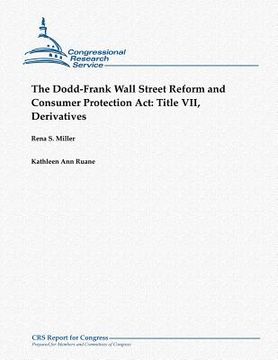Compartir
The Dodd-Frank Wall Street Reform and Consumer Protection Act: Title VII, Derivatives (en Inglés)
Rena S. Miller
(Autor)
·
Kathleen Ann Ruane
(Autor)
·
Createspace Independent Publishing Platform
· Tapa Blanda
The Dodd-Frank Wall Street Reform and Consumer Protection Act: Title VII, Derivatives (en Inglés) - Ruane, Kathleen Ann ; Miller, Rena S.
$ 28.770
$ 39.960
Ahorras: $ 11.190
Elige la lista en la que quieres agregar tu producto o crea una nueva lista
✓ Producto agregado correctamente a la lista de deseos.
Ir a Mis Listas
Origen: Estados Unidos
(Costos de importación incluídos en el precio)
Se enviará desde nuestra bodega entre el
Viernes 02 de Agosto y el
Miércoles 14 de Agosto.
Lo recibirás en cualquier lugar de Chile entre 1 y 3 días hábiles luego del envío.
Reseña del libro "The Dodd-Frank Wall Street Reform and Consumer Protection Act: Title VII, Derivatives (en Inglés)"
The financial crisis implicated the over-the-counter (OTC) derivatives market as a major source of systemic risk. A number of firms used derivatives to construct highly leveraged speculative positions, which generated enormous losses that threatened to bankrupt not only the firms themselves but also their creditors and trading partners. Hundreds of billions of dollars in government credit were needed to prevent such losses from cascading throughout the system. AIG was the best-known example, but by no means the only one. Equally troublesome was the fact that the OTC market depended on the financial stability of a dozen or so major dealers. Failure of a dealer would have resulted in the nullification of trillions of dollars' worth of contracts and would have exposed derivatives counterparties to sudden risk and loss, exacerbating the cycle of deleveraging and withholding of credit that characterized the crisis. During the crisis, all the major dealers came under stress, and even though derivatives dealing was not generally the direct source of financial weakness, a collapse of the $600 trillion OTC derivatives market was imminent absent federal intervention. The first group of Troubled Asset Relief Program (TARP) recipients included nearly all the large derivatives dealers. The Dodd-Frank Act (P.L. 111-203) sought to remake the OTC market in the image of the regulated futures exchanges. Crucial reforms include a requirement that swap contracts be cleared through a central counterparty regulated by one or more federal agencies. Clearinghouses require traders to put down cash (called initial margin) at the time they open a contract to cover potential losses, and require subsequent deposits (called maintenance margin) to cover actual losses to the position. The intended effect of margin requirements is to eliminate the possibility that any firm can build up an uncapitalized exposure so large that default would have systemic consequences (again, the AIG situation). The size of a cleared position is limited by the firm's ability to post capital to cover its losses. That capital protects its trading partners and the system as a whole. Swap dealers and major swap participants-firms with substantial derivatives positions-will be subject to margin and capital requirements above and beyond what the clearinghouses mandate. Swaps that are cleared will also be subject to trading on an exchange, or an exchange-like "swap execution facility," regulated by either the Commodity Futures Trading Commission (CFTC) or the Securities and Exchange Commission (SEC), in the case of security-based swaps. All trades will be reported to data repositories, so that regulators will have complete information about all derivatives positions. Data on swap prices and trading volumes will be made public. The Dodd-Frank Act provides exceptions to the clearing and trading requirements for commercial end-users, or firms that use derivatives to hedge the risks of their nonfinancial business operations. Regulators may also provide exemptions for smaller financial institutions. Even trades that are exempt from the clearing and exchange-trading requirements, however, will have to be reported to data repositories or directly to regulators.

